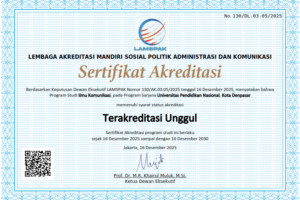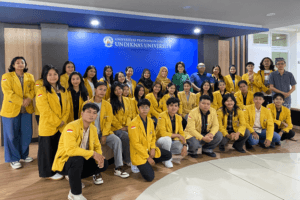
The Importance of Political Education to Stop the Pragmatism of the Political World
In the evolving political landscape of Indonesia, pragmatism has become a dominant trait that blurs the idealism that should be the primary foundation. Dr. Drs. I Nyoman Subanda, M.Si, a lecturer at Universitas Pendidikan Nasional Denpasar, explains the increasingly prominent phenomenon of pragmatism in Indonesian politics. Contemporary politics in Indonesia is characterized by political capitalism, low public trust, dynastic politics, and pragmatism. Dr. Subanda analyzes that political pragmatism contradicts idealism, which is based on moral and ethical values, and reflects a social reality oriented towards practical interests.
Political pragmatism creates what Dr. Subanda calls “merchant politics,” where market laws are applied in politics. This phenomenon allows capitalists to use their capital to win political competitions, buy strategic positions within parties, and even buy votes in elections. As a result, people who sell their votes lose hope in politics, while capitalists gain the right to determine policy directions according to their interests.
The implications of political pragmatism do not stop at one election cycle but continue in the process of public service and development priorities. Public officials from capitalist backgrounds tend to prioritize development and services for groups that contribute significantly to their votes, while other groups become “suffering groups” that may receive no attention at all. Additionally, strategic positions within the government bureaucracy become commodities traded in the market.
According to Dr. Subanda, this political pragmatism leads to subjective justice. Communities that do not receive services feel the government is unfair, while public officials feel they have acted fairly based on the vote contributions they received. This hampers the emergence of statesmanlike public officials who consider the nation’s progress and the future generation.
To overcome political pragmatism, Dr. Subanda suggests a multidimensional therapy starting from political parties. Political parties must implement idealism and stop transactional politics while carrying out the function of political education. Political education must start early with the younger generation, whether in schools, universities, or local communities through youth organizations or groups.
Political parties should also partner with universities, schools, and traditional authorities in conducting this political education. This effort must be continuous and accompanied by control functions and recall sanctions against public officials who do not implement the party’s ideology.
The importance of political education for the younger generation cannot be underestimated. With good political education, it is hoped that dignified politicians with statesmanship will emerge, capable of bringing positive changes to the nation. Dr. Subanda hopes that politics and democracy in Indonesia can become healthier and produce leaders who can advance the country and the welfare of the people.



